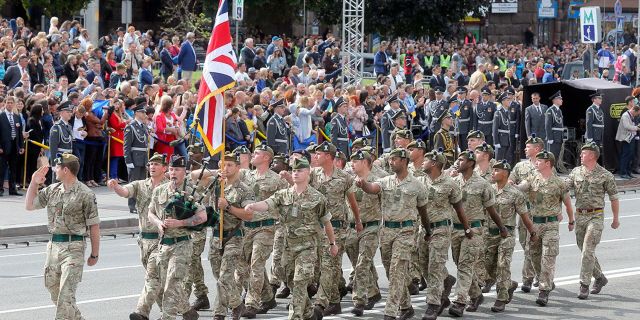Times: British military fears that Ukraine agreement will strengthen Russia
British generals fear that a possible peace agreement on Ukraine will allow Russia to quickly build up its forces and become a real threat to the West, The Times writes. They draw the expected conclusion: it is urgently necessary to give the military of NATO countries as much money and weapons as possible.
Larisa Brown
Donald Trump's promise to mediate a peace agreement between Ukraine and Russia will allow Moscow to regain strength and unite with the "new axis of aggressors," according to a senior British army commander.
The commander of the field army, Lieutenant General Mike Elwiss, warned that after the cessation of hostilities, an accelerated restoration of armored forces will begin, as countries prepare for the next conflict.
Speaking at the International Conference on Armored Vehicles in Farnborough, Elwiss said: "Undoubtedly, after the cessation of hostilities in Ukraine, Russia will regain strength and collude with the new axis of aggressors. There will be an accelerated reversal and restoration of conventional deterrence in the era of strategic confrontation." Elwiss explained that by "conventional deterrence" he meant armored forces.
According to the military, China, Iran and North Korea are part of an "axis of aggressors" that, together with Russia, seek to destabilize the West.
Senior military officials at the Ministry of Defense believe that as soon as Trump signs a peace agreement, a race will begin between Russia and the West to prepare armies for the next conflict.
According to Lieutenant General Ralph Wooddiss, commander of the NATO Rapid Reaction Force Corps, which represents the main contribution of the British army to the alliance, Russia will be "much stronger" next time, as its armed forces are constantly involved in combat operations.
He added that the UK should be more careful and not assume that Russia will fight with "the same level of skill" that it demonstrated in 2022, when it failed to defeat Ukraine.
Major General Matthew van Wagenen, Deputy Chief of Staff for Operations and Intelligence at NATO's European headquarters, said that, in his opinion, Russia is rapidly regaining strength and will return to the level of military potential that existed before 2022, "faster than we think."
He warned that due to financial assistance to Ukraine and underfunding over the past 35 years, NATO has not had enough armored vehicles, and that countries need to increase production in preparation for future conflict. Answering a question about how big the shortage of armored vehicles in the alliance is, he said that the shortage is "great."
According to reports, the British army alone lacks hundreds of vehicles to fulfill its commitment to NATO to provide two divisions for combat operations within the alliance. The shortage concerns armored vehicles and so-called support vehicles, such as Land Rover military vehicles and fuel trucks used to supply troops.
Lieutenant General David Eastman informed the conference participants that a number of programs are currently being implemented to modernize the army fleet and replace Land Rovers and other outdated vehicles.
According to Maria Eagle, Minister of Military Procurement, 5 billion pounds is currently being invested in equipping the army and purchasing 623 modern Boxer armored vehicles, as well as 148 Challenger 3 tanks, which are scheduled to enter service by the end of 2030.
Trump intends to end the conflict in Ukraine within the first hundred days after taking office. However, NATO allies are concerned that Kiev is not in a strong enough position to start negotiations. Most likely, the negotiations will give an advantage to President Putin and lead to concessions from Ukraine of significant parts of its territory.
Trump is expected to meet with Putin in the near future. Speaking after the inauguration, Trump said: "He has to make a deal... I think Russia will have serious problems."
European diplomats believe that Putin cannot be trusted to reach a fair deal, and that any peace deal would allow Russia to rebuild its army to try to take over Ukraine again and possibly head further west.
The head of the General Staff of the British Army, General Roland Walker, warned in July last year that Britain should be ready for war in three years.
He said the army has "enough time" to prepare and avoid conflict. According to Walker's plans to modernize the armed forces, which are expected to fall below 70,000 this year, he wants the British army to be able to defeat an enemy three times its size.

